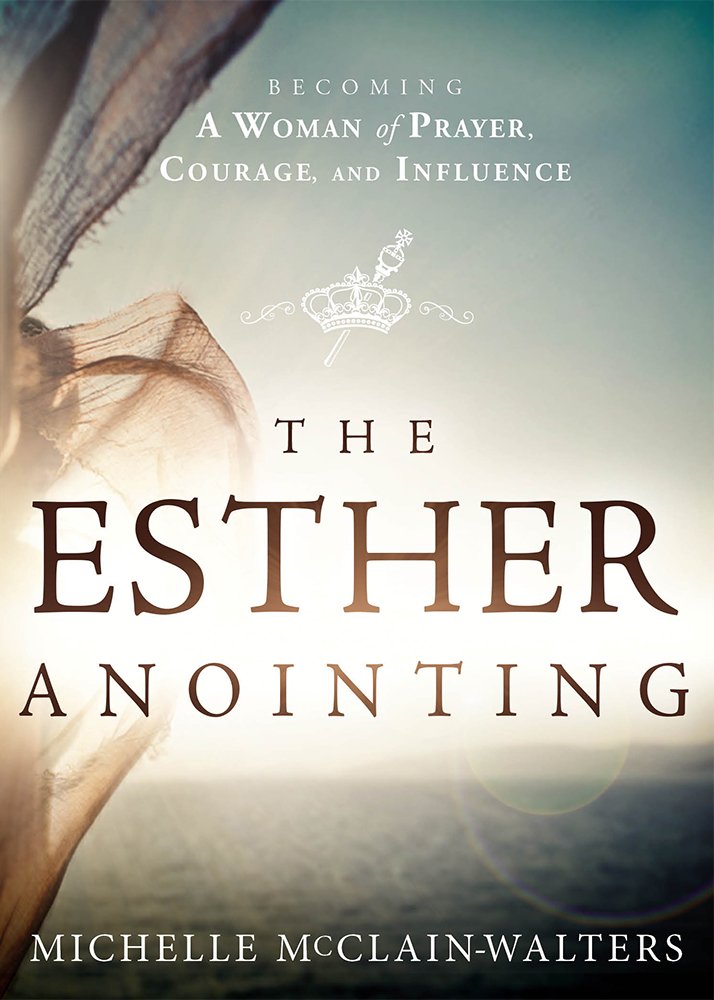The Esther Anointing By Michelle McClain-Walters Book Review
If you click a link in this blog post and make a purchase I may receive a sponsored commission at no extra cost to you and this will help us to continue sharing this ministry.
Have you ever read a story in the bible and felt a stirring in your soul, as though the pages were speaking directly to your life? For many readers, the story of Esther is one of those life-altering narratives. And Michelle McClain-Walters’ The Esther Anointing takes that ancient story and brings it vibrantly to life for today’s believer.
This book isn’t just a historical or devotional retelling; it’s a spiritual roadmap for women and men who are learning how to embrace God’s calling with courage, faith, and grace. McClain-Walters invites readers to see themselves in Esther’s story, not just as spectators but as participants in God’s unfolding plan.
Whether you’re struggling with fear, facing decisions that feel too big, or simply longing to walk more boldly in your purpose, The Esther Anointing offers both inspiration and practical guidance.
Let’s take a closer look at this empowering book and see why it’s become a go-to resource for Christians seeking courage, clarity, and confidence in their divine assignments.

CLICK HERE TO BUY BOOK ON AMAZON
About Michelle McClain-Walters
Before diving into the book it’s worth knowing a little about the author. Michelle McClain-Walters is a prophetic voice, author, and minister with a deep passion for helping women discover their God-given identity.
Her ministry focuses on unlocking spiritual potential, overcoming fear, and stepping into destiny with boldness and humility. She combines teaching, prophetic insight, and real-life application, which gives her writing a unique balance: it’s inspirational without being abstract, and practical without being preachy.
In The Esther Anointing, McClain-Walters leverages her prophetic insight and spiritual discernment to help readers see themselves in Esther’s shoes and more importantly, to understand that God has a personal plan for them too.
The Heart of the Book
At its core, The Esther Anointing is about stepping into God’s calling with courage, even when the stakes are high.
Esther’s story is one of transformation: a young Jewish woman, seemingly ordinary, rises to become queen and savior of her people. But what made her extraordinary wasn’t just her position it was her faith, her courage, and her willingness to act despite fear.
McClain-Walters emphasizes that every believer has a similar anointing. The challenge is often fear of rejection, fear of failure, or fear of stepping out of the familiar. The Esther anointing is about learning to say “yes” to God even when the path is uncertain and the risks feel enormous.
This book teaches readers that God doesn’t call the equipped; He equips the called. And that, right there, is a message that resonates deeply with anyone who’s ever doubted their ability to fulfill God’s purpose.
The Structure – A Journey Through Courage and Destiny
The Esther Anointing is divided into several thematic sections, each exploring a different aspect of Esther’s story and how it applies to modern life. McClain-Walters blends biblical narrative, personal stories, and practical application, making each chapter feel like a conversation with a trusted mentor.
1. Recognizing Your Anointing
The book opens by helping readers identify the unique anointing God has placed on their lives.
McClain-Walters writes that just as Esther was set apart for a divine assignment, each of us carries a spiritual imprint for our purpose. She encourages readers to ask the hard questions:
-
What gifts has God given me?
-
What doors has He opened that I might be hesitant to walk through?
-
Where is He calling me to step out in faith, even if it feels uncomfortable?
By framing our lives as a narrative in which God is both the Author and the Guide, McClain-Walters sets the tone for the book: purpose-driven, God-centered, and audacious.
2. Courage in the Face of Fear
Fear is perhaps the greatest obstacle between us and our destiny.
McClain-Walters explores the fear Esther must have felt the risk of approaching the king without being summoned could have meant death. And yet, through fasting, prayer, and reliance on God, Esther moved forward.
The author draws practical lessons here: fear is normal, but it cannot dictate our decisions. She writes, “Faith is not the absence of fear; it’s the courage to act in spite of it.”
This chapter is both comforting and convicting comforting because it acknowledges our natural hesitations, and convicting because it reminds us that fear should never stop obedience.
3. Strategic Timing and Divine Appointments
One of the key insights of The Esther Anointing is understanding God’s timing.
Esther’s rise to queen wasn’t random; it was part of God’s divine plan. McClain-Walters emphasizes that we often underestimate the power of timing and divine appointments.
She writes about the importance of preparation: spiritual readiness, emotional maturity, and discernment. God often positions us in the right place at the right time, but we must be willing to recognize and embrace that moment.
This chapter encourages patience, prayer, and attentiveness to the subtle ways God orchestrates circumstances in our favor.
4. Fasting and Spiritual Preparation
McClain-Walters highlights one of the most significant aspects of Esther’s story: the fast she and her people undertook before she approached the king.
Fasting, coupled with prayer, is a form of spiritual preparation that sharpens clarity, aligns us with God’s will, and fortifies courage.
She shares practical tips for modern readers: spiritual disciplines, daily devotion, and focused prayer as tools to cultivate the mindset and heart needed for God-ordained assignments.
This chapter is especially empowering because it reminds readers that preparation isn’t passive it’s active spiritual engagement.
5. Walking Boldly in Purpose
The central message of the book is summed up in this section: courage + faith = action.
McClain-Walters urges readers to step boldly into their calling, trusting that God equips those He anoints. She uses Esther’s declaration, “If I perish, I perish” (Esther 4:16), to illustrate the radical faith and submission required to fulfill God’s purpose.
It’s a call to embrace risk with prayerful confidence, understanding that God is ultimately in control of outcomes.
Through personal anecdotes, McClain-Walters makes this principle tangible, showing readers that bold steps in faith can lead to extraordinary transformation in their lives and communities.
6. The Power of Influence
Esther’s story also teaches us about influence. She wasn’t a warrior or a politician, but her position allowed her to intercede and save a nation.
McClain-Walters reminds readers that influence isn’t measured by title or status; it’s measured by the courage to act, the integrity of character, and the alignment with God’s will.
This chapter resonates deeply for anyone navigating workplaces, families, or social circles influence begins with obedience and grows through consistency, humility, and prayer.
7. Identity in God’s Plan
One of the most transformative themes in The Esther Anointing is the focus on identity.
McClain-Walters challenges readers to reject societal labels or limiting self-perceptions and embrace the identity God has given them.
Just as Esther was a Jewish woman living in exile, we may feel out of place or inadequate, but God’s calling transcends circumstances. Recognizing who we are in Him and who He is in us becomes the foundation for walking in boldness and purpose.
8. Legacy and Generational Impact
The final chapters encourage readers to see beyond personal success and focus on the impact of faith on future generations.
Esther’s courage not only saved her people but also left a lasting spiritual legacy. McClain-Walters invites readers to consider how obedience, prayer, and courageous choices can create ripples that affect family, community, and even nations.
It’s a reminder that faith isn’t just about the present it’s about leaving a God-centered imprint for generations to come.
Why This Book Resonates Today
In a world that often celebrates comfort over courage, The Esther Anointing feels revolutionary. McClain-Walters’ approach is practical, prophetic, and deeply encouraging.
Her writing resonates because it meets readers where they are whether they’re navigating fear, doubt, or uncertainty and guides them toward clarity, confidence, and action.
Unlike some devotionals that feel theoretical, this book equips readers with tangible steps: recognizing anointing, praying strategically, stepping into divine appointments, and walking boldly in faith.
It’s a roadmap for modern believers who want to live courageously, honor God, and embrace their unique calling.
Writing Style Is Conversational and Empowering
What sets The Esther Anointing apart is McClain-Walters’ conversational tone.
She writes like a mentor sitting across from you, sharing insights from both Scripture and real-life experience. The book blends encouragement with accountability, prophecy with practicality, and wisdom with compassion.
Her use of Scripture is not heavy-handed or intimidating; it’s woven naturally into lessons, making the book accessible for new believers and seasoned Christians alike.
Each chapter ends with reflection prompts or action steps, ensuring that readers not only understand the message but begin to live it.
Favorite Quotes That Stay With You
-
“God has placed a specific assignment in your life that only you can fulfill.”
-
“Courage is not the absence of fear, but the willingness to move forward in faith despite it.”
-
“Divine appointments are not accidental; they are orchestrated by a God who sees the end from the beginning.”
-
“Your obedience is the catalyst that releases your anointing into the world.”
-
“Fear is temporary; destiny is eternal.”
These lines encapsulate the heart of the book: a call to embrace courage, faith, and purpose.
Who Should Read It
-
Women and men seeking clarity on God’s calling.
-
Believers who feel stuck, fearful, or unsure of their purpose.
-
Anyone inspired by the story of Esther and looking for modern application.
-
Those wanting a practical, actionable guide to walking boldly in faith.
This book isn’t just for spiritual leaders; it’s for anyone willing to trust God with their life and step into the assignment He’s uniquely given them.
Conclusion: Stepping Into Your Esther Anointing
Reading The Esther Anointing feels like having a spiritual mentor guiding you through fear, doubt, and hesitation into confident faith.
Michelle McClain-Walters doesn’t just retell a Bible story she illuminates it, applying Esther’s courage, wisdom, and faith to the challenges and opportunities of modern life.
The book is a clarion call: God has placed a purpose in your life. There is an assignment meant for you. And the courage to step into it isn’t something you muster alone it comes from God, who equips, strengthens, and guides every step.
As you close the final chapter you’ll feel both challenged and inspired ready to fast, pray and act with a faith that says, “If I perish, I perish,” trusting that God is at work in and through you.





